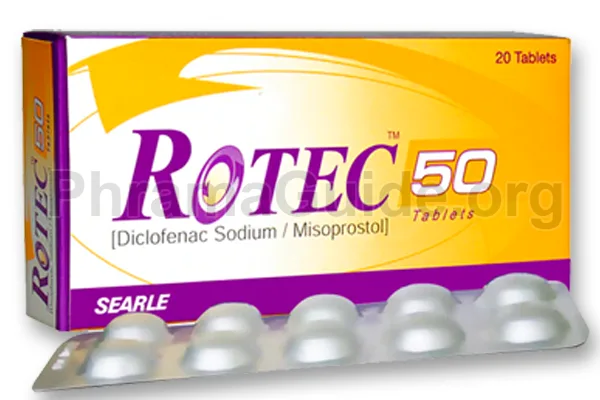Rotec is used to relieve pain and inflammation and to prevent stomach ulcers in individuals taking nonsteroidal anti-inflammatory drugs (NSAIDs). Here are common and less common side effects associated with Rotec.
Common Side Effects
- Gastrointestinal Disturbances: Stomach discomfort, indigestion, and abdominal pain are common side effects. Diclofenac (NSAID) can irritate the stomach lining, and misoprostol is included in Rotec to help protect the stomach.
- Diarrhea: Rotec can cause diarrhea, which may be bothersome for some individuals.
- Nausea and Vomiting: Some people may experience nausea and vomiting as a result of taking Rotec.
- Headache: Headache is a common side effect associated with Rotec.
- Dizziness: Dizziness or lightheadedness may occur with Rotec, especially when standing up quickly.
- Flatulence (Gas): Some individuals may experience increased gas production when taking Rotec.
- Constipation: In some cases, constipation can occur with Rotec.
Less Common Side Effects
- Heartburn: Some people may experience heartburn as a side effect of Rotec.
- Abdominal Cramps: Less common side effects associated with Rotec can include abdominal cramps or discomfort.
- Edema (Swelling): Swelling in the feet, ankles, or hands is less common but may occur in some individuals with Rotec.
- Hypertension (High Blood Pressure): Rotec can raise blood pressure in some people.
- Skin Rash: Skin rashes or itching are rare side effects but can occur with Rotec.
- Blood Disorders: There have been reports of blood disorders such as anemia, thrombocytopenia, and leukopenia. These are rare but serious side effects of Rotec that may require immediate medical attention.
- Kidney and Liver Function Changes: In rare instances, Rotec can lead to changes in kidney and liver function, which are generally reversible upon discontinuation of the medication.
- Severe Allergic Reactions: While rare, severe allergic reactions, including swelling of the face, tongue, or throat, difficulty breathing, and severe itching, have been reported with Rotec.

What is Rotec?
Rotec is one of the leading brands of Diclofenac and Misoprostol, manufactured and marketed by Searl, Pakistan.
Rotec : Available Formulations and Strengths
Presently, Rotec is available is Tablet Form
Rotec Tablets : Diclofenac 50mg, Misoprostol 200mg, and Diclofenac 75mg, Misoprostol 200mg strengths.
What Are The Possible Drug Interactions of Rotec?
- Anticoagulants (e.g., Warfarin): Rotec can increase the risk of bleeding, and when combined with anticoagulants, the risk of bleeding can be further elevated. Close monitoring of bleeding parameters is advisable.
- Other NSAIDs: Combining Rotec with other NSAIDs (e.g., ibuprofen, naproxen) can increase the risk of gastrointestinal bleeding and ulcers. This combination should be avoided unless directed by a healthcare professional.
- Corticosteroids: Combining Rotec with corticosteroids can increase the risk of gastrointestinal bleeding and ulceration. It can also increase the risk of adverse effects on the kidneys.
- Antiplatelet agents (e.g., Aspirin, Clopidogrel): Diclofenac can interact with antiplatelet drugs and increase the risk of bleeding.
- Selective Serotonin Reuptake Inhibitors (SSRIs) and Serotonin-Norepinephrine Reuptake Inhibitors (SNRIs): Combining Rotec with these antidepressants can increase the risk of bleeding and may increase the risk of gastrointestinal bleeding.
- Antihypertensive medications: Rotec can reduce the effectiveness of some antihypertensive drugs, potentially leading to increased blood pressure.
- Lithium: Rotec can increase lithium levels in the blood, potentially leading to lithium toxicity. Blood levels of lithium should be closely monitored when used together.
- Methotrexate: Rotec can increase the blood levels of methotrexate, potentially leading to methotrexate toxicity. Careful monitoring is essential when these medications are used together.
- Diuretics (e.g., Furosemide): Rotec can reduce the effectiveness of diuretics, potentially affecting blood pressure control.
- Cyclosporine and Tacrolimus: Rotec can increase the risk of kidney toxicity when used with these immunosuppressive drugs.

Leave A Comment